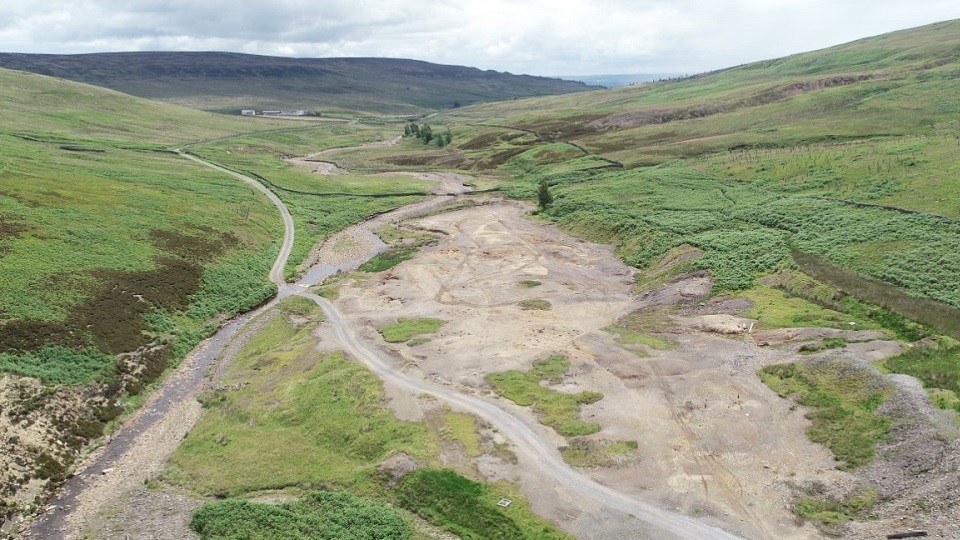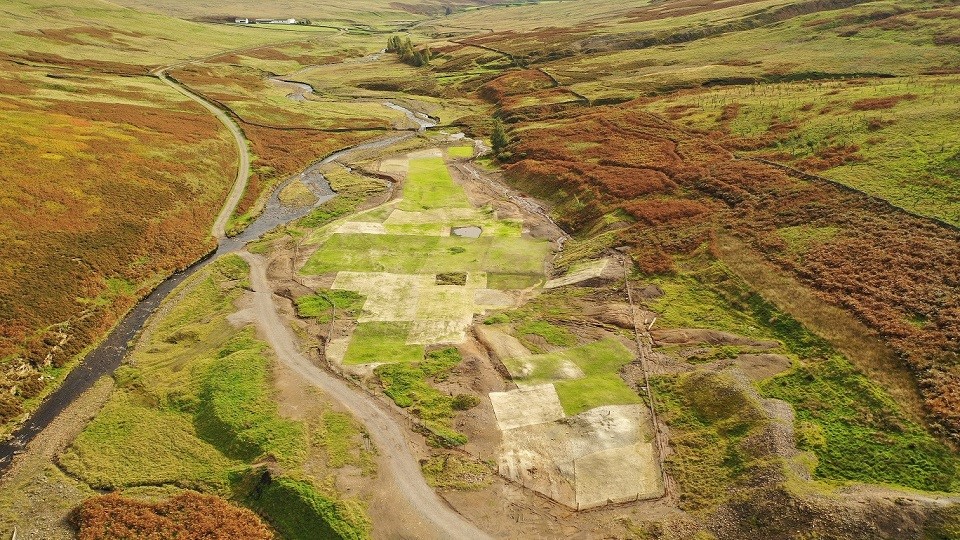The first phase of 2 innovative projects to reduce metal pollution from abandoned lead and zinc mines near Middleton-in-Teesdale has recently been completed.
The new measures include building 300m of new riverbank walls and sowing an array of grass and plant species on metal-contaminated land. This will limit metals being washed out of mine waste material and polluting Little Eggleshope and Great Eggleshope becks, both tributaries of the River Tees.
While metal mines played a major part in Britain’s history, the abandoned mines and waste they produce can now pollute our rivers and harm aquatic life.
The 2 projects has funding totalling £268,000 from the Water and Abandoned Metal Mines (WAMM) programme and The National Lottery Heritage Fund. The projects are helping to improve water quality and restore, expand and connect habitats in the North Pennines National Landscape.

Great Eggleshope
At the former Wire Gill Mine, trial plots of vegetation and grassland have been planted across 0.75 hectares of highly metal-contaminated ore processing wastes.
This means vegetation is now growing over bare mine waste material. This has numerous benefits for the environment including reducing metals being washed out of the mine waste material and increasing biodiversity through new grassland habitats. It also captures carbon dioxide in the soil.
Through these trial plots, the project team is exploring which combinations of vegetation and supportive material could work best for supporting growth on mine waste. 25 different grass, flower and herb species have been sown. Alongside a range of different materials such as compost, biochar and rock dust to help the plants grow and withstand different weather conditions.
Little Eggleshope
At the former California Mine, 900 tonnes of local stone has been used to build up 300 metres of riverbank walls. This is to prevent the beck from eroding highly metal-contaminated mine waste material.
In addition to this, 100 metres of drains have been installed to divert rainfall and river water away from the mine waste material. Together, these measures will decrease pollution of Little Eggleshope Beck by reducing the amount of metals like cadmium, lead and zinc that are being washed out of the mine waste material.
Dr Hugh Potter, the Environment Agency’s Water and Abandoned Metal Mine lead, said:
“These innovative projects in the North Pennines are already boosting biodiversity and will help to improve water quality in several kilometres of rivers that have been polluted since the 19th Century.
“These 2 interventions will help us to achieve the new Environment Act target to halve the length of rivers polluted by abandoned metal mines.
“Our continuing work, with a range of partners including the North Pennines National Landscape team, is bringing real environmental and economic benefits to the North East.”
Water Minister Robbie Moore said:
“I am very pleased to see the first phase of this major collaborative project coming to fruition, which will make a vital difference – both environmentally and economically – to the communities in the North Pennines.
“Through this important programme, we are tackling water pollution caused by historical metal mining, better protecting the natural environment, boosting biodiversity, and improving England’s waterways for generations to come.”
Committed to improving water quality
Mandie Kirk, Project Manager at the Coal Authority, added:
“This work clearly demonstrates the commitment of the Coal Authority and our partners to improving the water quality of these rivers. We are also undertaking this work in a nature-focussed way, to ensure that the biodiversity of the area can be restored and improved for future generations.”
Tim Longstaff, Project Manager at the Yorkshire Dales River Trust, said:
“The River Tees like so many of our rivers has many issues effecting its ecological health. As Rivers Trusts, it has been satisfying to work collaboratively with so many different organisations and individuals to start to tackle the pollution legacy left behind by the abandoned lead mining industry.”
Richard Wearmouth, tenant farmer involved in the project, added:
“It has been an interesting project to be part of and I have enjoyed working alongside the various organisations. We started with barren ground and now have natural vegetation coming through, something I found pleasing to be part of.”
The work has been delivered by the Yorkshire Dales Rivers Trust and Tees River Trust and is jointly funded by the Water and Abandoned Metal Mines (WAMM) programme and the North Pennines National Landscape Tees-Swale: Naturally Connected programme.
The Water and Abandoned Metal Mines (WAMM) programme is a partnership between the Environment Agency and Coal Authority to tackle water pollution caused by historical metal mining across England and is funded by Defra.
The Tees-Swale: Naturally Connected programme, led by the North Pennies National Landscape team in collaboration with the Yorkshire Dales National Park Authority, aims to restore, expand and connect habitats and is primarily funded by The National Lottery Heritage Fund.



